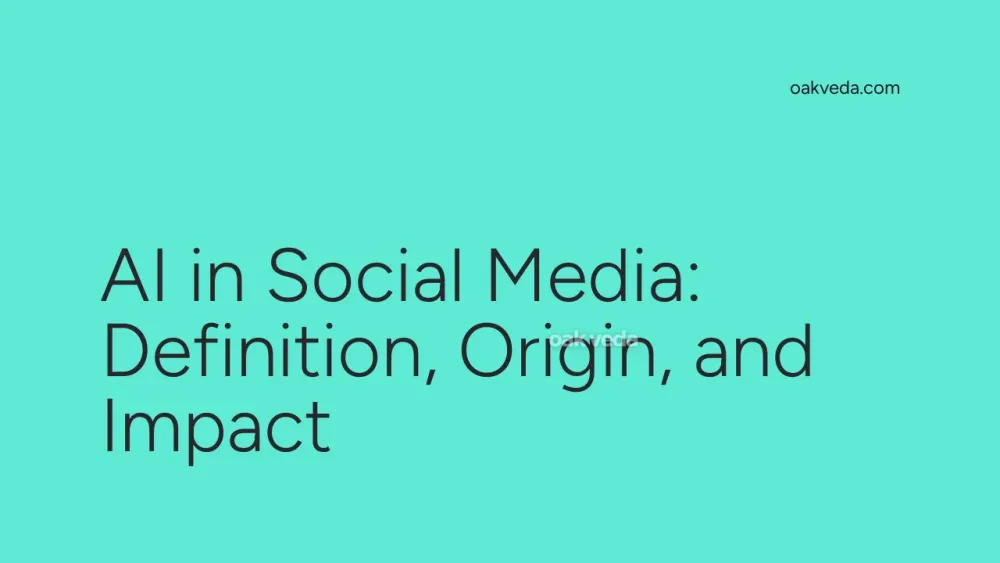
What is AI in Social Media?
Artificial Intelligence (AI) in social media refers to the integration of advanced computer systems capable of performing tasks that typically require human intelligence within social networking platforms. These AI-powered systems analyze vast amounts of data to make decisions, learn from user interactions, and continuously improve their performance over time.
Origin and Development of AI in Social Media
The integration of AI into social media platforms began in the early 2010s as companies sought to enhance user experiences and streamline their operations. Initially, AI was primarily used for basic content moderation and ad targeting. However, as technology advanced, social media giants like Facebook, Twitter, and LinkedIn started incorporating more sophisticated AI algorithms to personalize content, detect spam, and improve user engagement.
How AI Works in Social Media
AI in social media operates through various techniques, including:
- Machine Learning: Algorithms that learn from user data to predict preferences and behaviors.
- Natural Language Processing (NLP): Systems that understand and generate human language for chatbots and content analysis.
- Computer Vision: Technology that analyzes images and videos for content moderation and facial recognition.
- Deep Learning: Advanced neural networks that can process complex patterns in large datasets.
These technologies work together to analyze user behavior, content, and interactions to provide personalized experiences and improve platform functionality.
Types of AI Applications in Social Media
- Content Curation: AI algorithms that personalize news feeds and recommend content based on user preferences.
- Chatbots and Virtual Assistants: AI-powered conversational interfaces that provide customer support and engage users.
- Image and Video Recognition: Systems that can identify objects, faces, and scenes in visual content.
- Sentiment Analysis: AI that interprets the emotional tone of text-based posts and comments.
- Predictive Analytics: Algorithms that forecast trends and user behavior for targeted marketing.
Popular Examples of AI in Social Media
- Facebook's DeepFace: An AI system that can recognize faces with near-human accuracy.
- Instagram's Explore Page: Uses AI to curate personalized content for users.
- Twitter's Timeline Ranking: AI-powered algorithm that determines the order of tweets in a user's feed.
- LinkedIn's Job Recommendations: AI system that matches job seekers with relevant opportunities.
- Later's AI Caption Writer: Tool that generates on-brand Instagram captions using AI analysis.
Impact of AI on Social Media Culture
AI has significantly transformed social media culture by:
- Personalizing User Experiences: Tailoring content to individual preferences, increasing engagement.
- Enhancing Content Moderation: Improving the detection and removal of harmful or inappropriate content.
- Facilitating Targeted Advertising: Enabling more precise ad targeting based on user behavior and interests.
- Streamlining Customer Service: Providing instant responses through AI-powered chatbots.
- Influencing User Behavior: Shaping how users interact with platforms through algorithmic content curation.
Controversies Surrounding AI in Social Media
While AI has brought numerous benefits to social media, it has also sparked debates and concerns:
- Privacy Issues: The extensive data collection required for AI raises privacy concerns.
- Filter Bubbles: AI-driven content curation may limit exposure to diverse viewpoints.
- Algorithmic Bias: AI systems can perpetuate or amplify existing biases in data.
- Job Displacement: Automation of certain tasks may lead to job losses in social media management.
- Misinformation Spread: AI can be exploited to create and distribute fake news and deepfakes.
How Brands and Influencers Use AI in Social Media
Brands and influencers leverage AI to:
- Optimize Posting Times: Tools like Later's Best Time to Post feature use AI to determine optimal engagement periods.
- Generate Content: AI-powered tools assist in creating captions, hashtags, and even visual content.
- Analyze Performance: AI analytics tools provide insights into content performance and audience behavior.
- Automate Interactions: Chatbots and AI assistants manage customer inquiries and engagement.
- Identify Trends: AI helps brands and influencers stay ahead of emerging topics and hashtags.
Future Trends in AI and Social Media
The future of AI in social media looks promising, with several emerging trends:
- Advanced Personalization: Even more tailored experiences based on deeper understanding of user preferences.
- Augmented Reality Integration: AI-powered AR filters and experiences becoming more sophisticated.
- Predictive Content Creation: AI systems that can generate entire posts or campaigns based on brand guidelines.
- Emotion Recognition: AI that can interpret and respond to users' emotional states.
- Cross-Platform AI: Integrated AI systems that work across multiple social media platforms for cohesive strategies.
FAQs about AI in Social Media
-
Is AI replacing human social media managers? While AI is automating many tasks, human creativity and strategic thinking remain crucial in social media management.
-
How can small businesses benefit from AI in social media? Small businesses can use AI-powered tools for content scheduling, analytics, and customer service to compete more effectively.
-
Are AI-generated captions as effective as human-written ones? AI-generated captions can be effective, but often require human review and customization for optimal results.
-
How does AI impact social media advertising? AI enhances ad targeting, optimizes ad placement, and helps predict campaign performance.
-
Can AI help in crisis management on social media? Yes, AI can monitor sentiment, detect potential issues early, and assist in rapid response during crises.
As AI continues to evolve, its integration with social media platforms will likely deepen, offering both exciting opportunities and challenges for users, brands, and society at large. The key to harnessing its potential lies in balancing innovation with ethical considerations and human oversight.
You may be interested in:
- Viral: Definition, Origin, and Impact on Social Media
- Linktree: Definition, Origin, and Impact on Social Media
- Retweet: Definition, Origin, and Impact on Social Media
- Ick: Definition, Origin, and Impact on Social Media Culture
- Retargeting: Definition, Origin, and Impact on Social Media
- Innit: Definition, Origin, and Impact on Social Media

